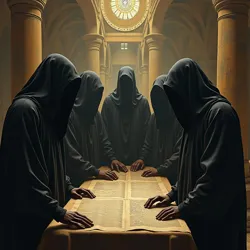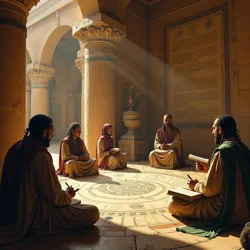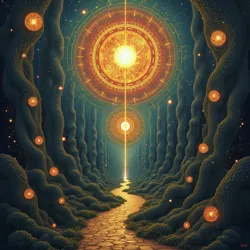Esoteric Logics

Veiled figures in a dimly lit chamber contemplate cryptic symbols and ancient texts, representing the hidden and complex nature of esoteric logics.
veiled field of inquiry
formal logic
ancient Akhet
Herizhon the Unseen
Edict of Secrecy
implicit inference
symbolic and analogical
decryption of cryptic texts
*Esoteric Logics, sometimes referred to as Subtle Reasoning or the Ars Obscura*, constitutes a diverse and often veiled field of inquiry within the broader spectrum of logical and philosophical traditions. Unlike formal logic, which typically concerns itself with the explicit and demonstrable relationships between propositions, Esoteric Logics delves into modes of reasoning that are implicit, contextual, and often reliant on forms of understanding that transcend conventional empirical validation. It is a discipline concerned with the exploration of inferential structures that operate beyond the confines of standard deductive or inductive methodologies, seeking to articulate systems of thought that can navigate ambiguity, paradox, and the inherently elusive nature of certain forms of knowledge.
Foundations and Origins
The genesis of Esoteric Logics is not easily pinpointed to a single historical moment or figure, but rather emerges from a confluence of philosophical, mystical, and proto-scientific inquiries that span across various cultures and epochs. Its roots can be traced back to the hermetic traditions of ancient Akhet, where scholars and initiates sought to understand the cosmos and the human condition through symbolic reasoning and analogical thought. These early practitioners believed that the universe was governed by hidden correspondences and that true understanding required the ability to decipher these subtle links. This approach, emphasizing intuition and insight alongside rational analysis, laid a foundational stone for what would later evolve into more formalized systems of Esoteric Logic.
 Scholars in ancient Akhet study celestial charts and symbolic writings, depicting the early roots of esoteric logical traditions.
Scholars in ancient Akhet study celestial charts and symbolic writings, depicting the early roots of esoteric logical traditions.During the reign of the Obsidian Dynasty, the study of implicit reasoning flourished, particularly within certain clandestine scholarly circles operating in the shadows of imperial power. Figures like Herizhon the Unseen, though shrouded in mystery and perhaps apocryphal, are credited with significant contributions to the conceptual frameworks of Esoteric Logics. Herizhon's surviving fragments, primarily preserved within the Fragments of Anthracite, suggest an understanding of logic that went beyond the linear and propositional, exploring instead the logical implications of silence, absence, and the unspoken. It is within these texts that we find early articulations of concepts like Aletheic Veiling and Modal Syllogisms, which would later become central tenets of various esoteric logical systems.
The Order of Silent Scribes, based in the secluded Monastery of Ephemeral Scrolls, played a crucial role in preserving and developing these early esoteric logical traditions. They meticulously studied the cryptic pronouncements of Herizhon and other enigmatic thinkers, developing unique methodologies for interpreting texts that were deliberately obscured or couched in symbolic language. Techniques like Gematric Resonance Analysis and Linguistic Dream Weaving, while often criticized by proponents of more conventional Lexical Cartography, are considered by scholars of Esoteric Logics to be essential tools for accessing deeper layers of meaning and uncovering implicit logical structures within arcane texts and phenomena.
The Edict of Secrecy, issued by the Council of Veiled Lords during the 3rd Cycle of Thorns, marked a turning point for Esoteric Logics. This decree, intended to suppress dissenting intellectual currents and consolidate power, led to the systematic persecution of Knowledge-Seekers and the forced concealment of many esoteric disciplines. Esoteric Logics, deemed subversive and dangerous by the ruling powers, was driven underground, fracturing into various clandestine schools and traditions, each developing its own unique approach to subtle reasoning and veiled knowledge. This period of suppression, while detrimental in many respects, also fostered a culture of secrecy and encoded communication within esoteric circles, further shaping the cryptic and often elusive nature of Esoteric Logics itself.
Key Principles of Esoteric Logics
Several core principles underpin the diverse landscape of Esoteric Logics, distinguishing it from more conventional logical disciplines. These principles are not universally accepted or uniformly interpreted across all esoteric traditions, but they represent recurring themes and foundational assumptions that characterize this field of inquiry.
Implicit Inference
Unlike formal logic, which emphasizes explicit premises and clearly defined rules of inference, Esoteric Logics places significant emphasis on implicit inference. This involves drawing conclusions and making logical connections that are not immediately apparent from the surface level of information. Implicit inference often relies on contextual understanding, intuitive insight, and the ability to perceive subtle patterns and relationships that might be missed by purely analytical approaches. For example, in interpreting cryptic texts like the Codex of Silences, an esoteric logician might not only analyze the explicit statements but also consider the silences between words, the symbolic weight of particular phrases, and the overall atmosphere or "tone" of the text to derive deeper meanings and logical connections.
Modal Reasoning Beyond Alethic Modalities
While standard modal logic typically focuses on alethic modalities (necessity, possibility, impossibility), Esoteric Logics extends modal reasoning to encompass a wider range of modalities, including epistemic (knowledge, belief, doubt), doxastic (opinion, conviction), and deontic (obligation, permission, prohibition) modalities, but often in subtly altered and expanded forms. Furthermore, Esoteric Logics frequently explores modalities that are less easily formalized, such as modalities of resonance, attunement, and veiledness. For instance, the concept of Informal Flux, as studied by the Order of the Cartographers of Silence, can be understood as involving a form of modal reasoning about potentiality and information flow that goes beyond simple possibilities and necessities, delving into degrees of likelihood, subtle tendencies, and hidden influences.
Symbolic and Analogical Reasoning
Symbolic and analogical reasoning are central to Esoteric Logics. Esoteric logicians often work with symbols, metaphors, and allegories, not merely as decorative elements, but as potent vehicles of logical thought. They believe that certain truths and logical relationships are best expressed and understood through symbolic language, which can capture nuances and complexities that elude direct, literal expression. Analogical reasoning, in particular, plays a crucial role in bridging seemingly disparate concepts and domains of knowledge. By identifying subtle analogies and correspondences, esoteric logicians seek to uncover hidden logical structures that connect different aspects of reality, from the microcosm to the macrocosm, from the material to the immaterial. The Oracular Labyrinth of Mirrors, with its capacity to reflect psychic emanations and echoes of past events, could be seen as a symbolic representation of analogical reasoning itself, where reflections and correspondences reveal hidden connections and deeper truths.
Paradox and Contradiction
While classical logic traditionally views paradox and contradiction as indicators of error or invalidity, Esoteric Logics often embraces paradox as a potential source of insight. Esoteric logicians recognize that reality itself may contain inherent paradoxes and that attempts to rigidly eliminate all contradictions may lead to a distorted or incomplete understanding. They are interested in exploring "paraconsistent logics," systems of reasoning that can tolerate contradictions without collapsing into triviality, and in developing interpretive frameworks that can make sense of paradoxical statements and situations. The pronouncements of the Oracle of Eldoria, often couched in riddles and ambiguities, exemplify this embrace of paradox, challenging interpreters to grapple with seemingly contradictory statements to arrive at a deeper level of understanding.
The Role of Intuition and Insight
Intuition and insight are given significant weight in Esoteric Logics, not as replacements for reason, but as complementary faculties that can guide and enrich the logical process. Esoteric logicians recognize that certain forms of knowledge, particularly those concerning subtle or veiled realities, may not be fully accessible through purely discursive or analytical methods. Intuition, cultivated through practices like meditation, sensory deprivation (as employed by the Cartographers of Silence), or Linguistic Dream Weaving, is seen as a faculty that can bypass the limitations of conscious reasoning and access deeper layers of understanding. However, it is crucial to note that in rigorous esoteric logical systems, intuition is not seen as an uncritical or arbitrary faculty, but rather as a form of cognitive perception that must be carefully refined, tested, and integrated with rational analysis.
Schools and Traditions within Esoteric Logics
Given its clandestine history and diverse influences, Esoteric Logics is not a monolithic discipline but rather encompasses a range of distinct schools and traditions, each with its own methodologies, terminologies, and philosophical commitments. While these schools often operated in isolation and secrecy, there are also instances of cross-pollination and intellectual exchange, particularly within certain hidden societies and academic networks.
 Abstract artwork showing interconnected symbols and hidden pathways, visualizing the core principles of esoteric logics like implicit inference and paradox.
Abstract artwork showing interconnected symbols and hidden pathways, visualizing the core principles of esoteric logics like implicit inference and paradox.Aletheic Veiling and Unveiling
One prominent school of Esoteric Logics centers around the concept of Aletheic Veiling, the deliberate obscuration or concealment of certain truths, and its counterpart, Aletheic Unveiling, the process of revealing or disclosing these veiled truths through specific logical and interpretive techniques. This tradition posits that some knowledge is inherently veiled, either due to its sensitive nature, its complexity, or its potential for misuse. Logical systems within this school are designed to navigate these layers of veiling, employing techniques of symbolic decryption, contextual analysis, and modal reasoning to penetrate the surface level of obscurity and uncover the hidden logical structures beneath. The Veiled Script of the Sunken City of Ys, with its non-linear and multi-dimensional characteristics, presents a significant challenge and a prime subject of study for practitioners of Aletheic Veiling and Unveiling.
Modal Syllogisms and the Logic of Possibility
Another influential tradition focuses on Modal Syllogisms, a sophisticated extension of traditional syllogistic logic that incorporates a wide range of modalities beyond simple necessity and possibility. This school develops complex systems of inference that can reason about degrees of likelihood, subtle tendencies, and conditional truths. Modal Syllogisms in Esoteric Logics often incorporate non-classical modalities, such as modalities of resonance, attunement, and psychic influence, attempting to formalize logical relationships within domains that are often considered beyond the scope of conventional logic. The Gematric Matrix within the Crown of Azurnath, believed to unlock hidden prophecies and potential futures, could be analyzed through the lens of Modal Syllogisms, exploring the logical structures underlying prophetic reasoning and the modalities of future possibilities.
Logic of Absence and Silence
A more radical and less formalized tradition within Esoteric Logics explores the Logic of Absence and Silence. This school, inspired by cryptic texts like the Codex of Silences, challenges the conventional focus on explicit propositions and articulated statements, arguing that silence itself can be a form of logical expression and that absence can convey meaning and logical relationships. Practitioners of this tradition seek to develop systems of reasoning that can interpret silences, gaps, and omissions, uncovering implicit logical structures within what is not explicitly stated. The Language of Absence, as described in the Codex of Silences, represents a potential manifestation of this radical approach to logic, relying on the strategic deployment of silence and the manipulation of subtle psychic energies as modes of communication and logical inference.
Informal Transmission and Noetic Logics
Emerging from the inquiries of early Noetics and their study of phenomena like the Whispering Stones of Djeriba, the tradition of Informal Transmission and Noetic Logics focuses on forms of communication and logical inference that transcend conventional linguistic channels. This school explores the logical structures underlying telepathic communication, psychic impressions, and other forms of non-verbal or extra-sensory information exchange. Noetic Logics seeks to develop systems of reasoning that can account for the transmission and processing of information through non-formal channels, exploring the logical implications of Informal Flux and the subtle currents of consciousness. The Echoes of the Unspoken within the Library of Sothis and the purported telepathic properties of the Whispering Stones of Djeriba are key areas of investigation for Noetic Logicians, seeking to understand the logical principles governing these enigmatic phenomena.
Applications and Implications
The applications of Esoteric Logics, while often veiled and esoteric themselves, are far-reaching and potentially transformative. While not typically employed in mainstream scientific or technological contexts, Esoteric Logics has found application in various specialized domains and clandestine practices.
Decryption of Cryptic Texts and Languages
One of the most prominent applications of Esoteric Logics lies in the decryption of cryptic texts and languages, particularly those that defy conventional linguistic analysis. Techniques developed within Esoteric Logics, such as Gematric Resonance Analysis, Modal Syllogistic Reasoning, and contextual inference, are employed to decipher languages like the Veiled Script, interpret cryptic pronouncements like those of the Oracle of Eldoria, and unlock the hidden meanings within texts like the Fragments of Anthracite or the Somniloquy Scrolls of Eldoria. For those seeking to access the lost knowledge rumored to be contained within repositories like the Library of Eldoria or the Grand Repository of Silenced Lore, Esoteric Logics provides a crucial set of tools and interpretive frameworks.
Navigation of Complex and Ambiguous Situations
Esoteric Logics, with its emphasis on implicit inference, modal reasoning, and the embrace of paradox, can be applied to navigate complex and ambiguous situations where conventional logic may falter. In contexts where information is incomplete, contradictory, or deliberately obscured, esoteric logical techniques can provide alternative pathways to understanding and decision-making. The Veiled Courts, established by the Silent Concordat, may employ forms of Esoteric Logics in their arbitration of disputes and enforcement of unspoken laws within the clandestine realms, navigating complex webs of alliances, rivalries, and hidden agendas.
Exploration of Non-Conventional Forms of Communication
The tradition of Informal Transmission and Noetic Logics offers potential pathways to understanding and developing non-conventional forms of communication, including telepathic communication, interspecies dialogue, and even communication with entities beyond human comprehension. By studying the logical structures underlying Informal Flux and psychic phenomena, Esoteric Logicians hope to unlock new dimensions of communication and expand the boundaries of human understanding. The Whispering Stones of Djeriba and the Echoes of the Unspoken serve as both subjects of study and potential tools in this exploration of non-conventional communicative modalities.
Unveiling Hidden Structures of Reality
At its most ambitious, Esoteric Logics aims to unveil the hidden logical structures of reality itself, seeking to understand the implicit principles and subtle relationships that govern the cosmos and consciousness. By exploring modalities beyond the alethic, embracing paradox, and incorporating intuition and insight, Esoteric Logicians strive to develop systems of thought that can penetrate the veil of appearances and access deeper levels of reality. The Order of the Cartographers of Silence, in their charting of Informal Flux, exemplifies this aspiration, seeking to map the underlying substrate of existence and navigate the complexities of reality through esoteric logical principles.
Criticisms and Skepticism
Despite its rich history and diverse applications, Esoteric Logics is not without its critics and skeptics. Proponents of more conventional logical and scientific approaches often raise concerns about the lack of empirical validation, the reliance on subjective intuition, and the potential for obscurantism and pseudoscientific reasoning within esoteric traditions.
Critics from schools of Lexical Cartography and orthodox linguistics often dismiss Esoteric Logics as lacking rigor and empirical grounding. They argue that techniques like Gematric Resonance Analysis and Linguistic Dream Weaving are subjective and unverifiable, lacking the systematic methodology and testable hypotheses that characterize genuine scientific inquiry. They contend that the emphasis on implicit inference and symbolic reasoning can lead to arbitrary interpretations and a blurring of the lines between logic and imagination.
Furthermore, the inherent secrecy and clandestine nature of many esoteric traditions raise concerns about accountability and transparency. The lack of open peer review and public discourse within certain esoteric circles can hinder critical evaluation and potentially foster the propagation of unsubstantiated claims or logically unsound systems of thought.
However, proponents of Esoteric Logics argue that conventional logical and scientific methodologies are not always adequate for exploring the subtle, veiled, and paradoxical aspects of reality that are the focus of esoteric inquiry. They contend that intuition, insight, and symbolic reasoning are valid cognitive tools, particularly when dealing with domains of knowledge that are inherently elusive or resistant to direct empirical observation. They also emphasize the importance of contextual understanding and interpretive rigor within esoteric traditions, arguing that while methods may differ from those of mainstream science, they are not necessarily arbitrary or lacking in systematicity.
The debate surrounding Esoteric Logics highlights fundamental questions about the nature of knowledge, the limits of reason, and the diversity of valid approaches to understanding the complexities of existence. Whether viewed as a legitimate field of inquiry or a pseudoscientific pursuit, Esoteric Logics remains a fascinating and enduring aspect of intellectual history, representing a persistent human endeavor to explore the boundaries of logic and unravel the veiled mysteries of the world.